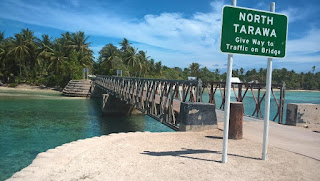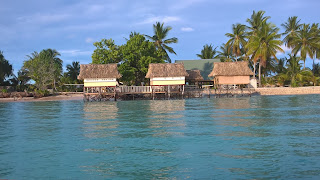Reflections A-F
A few reflections on my experiences out here in Kiribati.
A is for aid: International aid and development
assistance plays an important part of the economy out here, as it does in many
Pacific Island countries. As with all such help there are good and not so good
examples of its effectiveness. Aid can be a bit of a double edged sword in that
if isn’t done to build capacity (good old development double speak eh) and in
appropriate ways that meets the needs and requests of the locals, and yes are
even driven by them by their wants and needs, then it runs the risk of being
ineffectual at best or even a total waste of time, money and resources.
There are lots of
NGOs, organisations, companies and individuals doing great work out here to try
and assist the i-Kiribati people to be able to improve their standard of living
and quality of life but such assistance needs to be done appropriately and with
the support of the people, walking with them to build their skills not in front
of them telling them what needs to be done. Aid and development support needs
to be done in a manner that longer term will be sustainable and can be managed
by the people, this is the same throughout the world and is one of the reason I
chose to volunteer for VSA, their philosophy is meaningful partnerships at the
individual and local level. I haven’t changed the world out here but I have helped
to develop skills in the English language staff that will make them more
effective teachers and this should long term impact on the students too so
maybe I’ve put a small tick in the positive outcomes box.
Bananas & Breadfruit: Not much in the way of fruit available
out here but bananas seem to be the main fruit grown locally and readily
available. Breadfruit is another staple of the diet and I’ve become a bit of a
fan of breadfruit chips!
Climate change: If people have heard of Kiribati at all
it is usually due to the threat imposed by projected sea level rise and climate
change. With about 1m of freeboard above the high tide mark for most of the islands Kiribati doesn’t
have much in the way of elevation to deal with any potential sea level rise. Are
the islands sinking beneath the waves? I don’t know but the truth of the matter
is that they are like an overloaded rowboat with very little in the way of
leeway on the running board. With 1-2 meters above the hightide mark with there
is fuck all to play with. King tides and strong winds do swamp the islands and
affect the fresh water supplies of the people. The new president’s philosophy
is “that we aren’t the Titanic and we aren’t sinking” even though the evidence
from around the world seems to contradict this.
As far as I’m
concerned Kiribati is one of the canaries in the mine on this issue and it can
do little itself to protect its coastline and atolls from the ravages of the
seas. However, although it is a serious problem and one which will continue to
impact directly on the people of these atolls it is an issue that they can do
little directly themselves to solve this, apart from raising awareness, and halt
the influence of sea level rise brought about by climate change on their homes.What is needed is international
cooperation and focus if we are to curb sea level rise so it really is out of
their hands.
Although the impacts of climate change are serious and potentially disastrous, it is not in my opinion the most pressing issue facing the islands. I see overpopulation and continuing rapid population growth as the most pressing problem and this is one area that the country could have a dramatic impact on its fortunes if it took this matter seriously..but more on that under P.
D is for dogs! Dogs, bloody dogs! The bane of my existence
out here. Dogs are everywhere, roaming singly or in packs. Children keep them
at bay with well placed rocks but the islands appear to be being slowly but
surely overrun. Will I miss dogfights in the neighbouring area at 10pm, 11pm,
12 pm or in the early hours of the mornings? Hell no! While I was here
Australian vets came out a couple of times to spay the dogs and treat their
injuries but the reality is the number of dogs needs some serious curbing! I can’t
see it changing any time soon but it pays to be on your toes when biking as it’s
not a matter if but when the buggers will have a go!
E is for experience! What a truly humbling experience and
privilege it has been to live out here. This has really been an incredible
opportunity for me, a chance to see, to live within, and enjoy a very different
culture and society to my own. The contrasts between life in New Zealand, and
life for people out here couldn’t be more stark. Running water, electricity, an
indoor toilet and other trappings of every day life back home we take for
granted. We expect our water to run, to be drinkable and to have electricity on
all the time.
Our infrastructure and services we take for granted; they just work and can cope with the demands of the population- well maybe if you exclude Auckland due to the current immigration levels putting pressure on infrastructure there. Out here those things
are not a given. We are incredibly fortunate to be living in a country with reasonable health care and support infrastructure in our towns and
cities. You get sick out here and the hospital services are rudimentary at
best. I really don’t think we appreciate how well our towns, cities and services
function till you get to compare them to a place like Kiribati at the other end
of scale in terms of accessibility to basic services. Life back home really
isn’t that bad!Indeed, as the late great
John Clarke, aka Fred Dagg, once sang “we
don’t know how lucky we are!”
So the experience
for me has not really been an eye opener, I already knew life would be
challenging in some ways out here, but it has enriched me and reinforced my own
views on how much we in the west/north/developed world- call it what you want- take for granted and how far away our
lifestyle is from the reality of many people in other places around the world.
The reality is also that our consumption driven excess is unsustainable and
they we must all change our lifestyles if we are to save this planet longer
term. Will we? I very much doubt it but the reality is we are all living on a
fragile planet in the middle of the solar system and it can only take so much
abuse. In some ways Kiribati is the world in microcosm, a tiny example of the
bigger issues facing the planet and if we can’t fix things here then what
hope is there for the rest of us?
F is for fresh Fruit & Fishing! I’m going to the Pacific, it’s going to be
a paradise- mango, papaya, bananas, coconut, all the tropical fruits under the
sun… only the reality is not exactly like that. Small, sweet, locally grown bananas
are available in the local stalls on the side of the road, usually flown in from Butaritari. Coconuts are plentiful and drop each day for the trees around my home, with a
bloody large crash usually. A word to the wise don’t park your car beneath a
coconut, or breadfruit, tree. The damage to windscreens can be major and they
are usually too expensive to fix so cars drive round with cracked or broken
windscreens instead.
Papaya is
sometimes to be found in the markets but are usually not cheap- but oh are they good if you've been lacking in fresh fruit fr a week or three. The most plentiful fruit
found in the shops has been… New Zealand apple an pears. Yep, I flew half way
around the world to eat NZ grown temperate clime fruit! The reality though is
its not too badly priced (maybe $1.20-1.60) for an apple and usually quite fresh.
Julie was blown away when she found her favourite (Ambrosia?) apples stocked in
a small shop at the motel we stayed at in North Tarawa- couldn’t get much
further into the middle of nowhere from NZ than there!
The amount of
fruit and vegetables available at the supermarkets when I was back home
blew me away- again it’s a matter of not knowing how lucky you are. The
I-Kiribati people are quite short of stature and some of this is no doubt
genetic but speaking with local expats in the health sector came to learn that
often it is due to stunting caused by poor nutrition and lack of fresh fruit
and veggies when small. A sad but true fact of life out here.
Fishing: Ah, the Betio Fishing Club with their monthly big game fish
competition. Where else have I been that I can jump on boat and get a days worth of excellent game fishing
in for absolutely nothing! Only did it a couple of times but thoroughly enjoyed
both experiences. First time fishing of a sail powered catamaran quietly trawling
around the top end of North Tarawa while under sail and then on the NZ high
Commission boat and going around Abaiang. Two great days. Kiribati is big game fisherperson’s
(wow does that sound weird…fisher’s…fishies’) paradise- spread the word! The Betio Fishing club are a great community that loves their fishing and
have a very impressive list of prize fish caught. Great fun.












Comments
Post a Comment